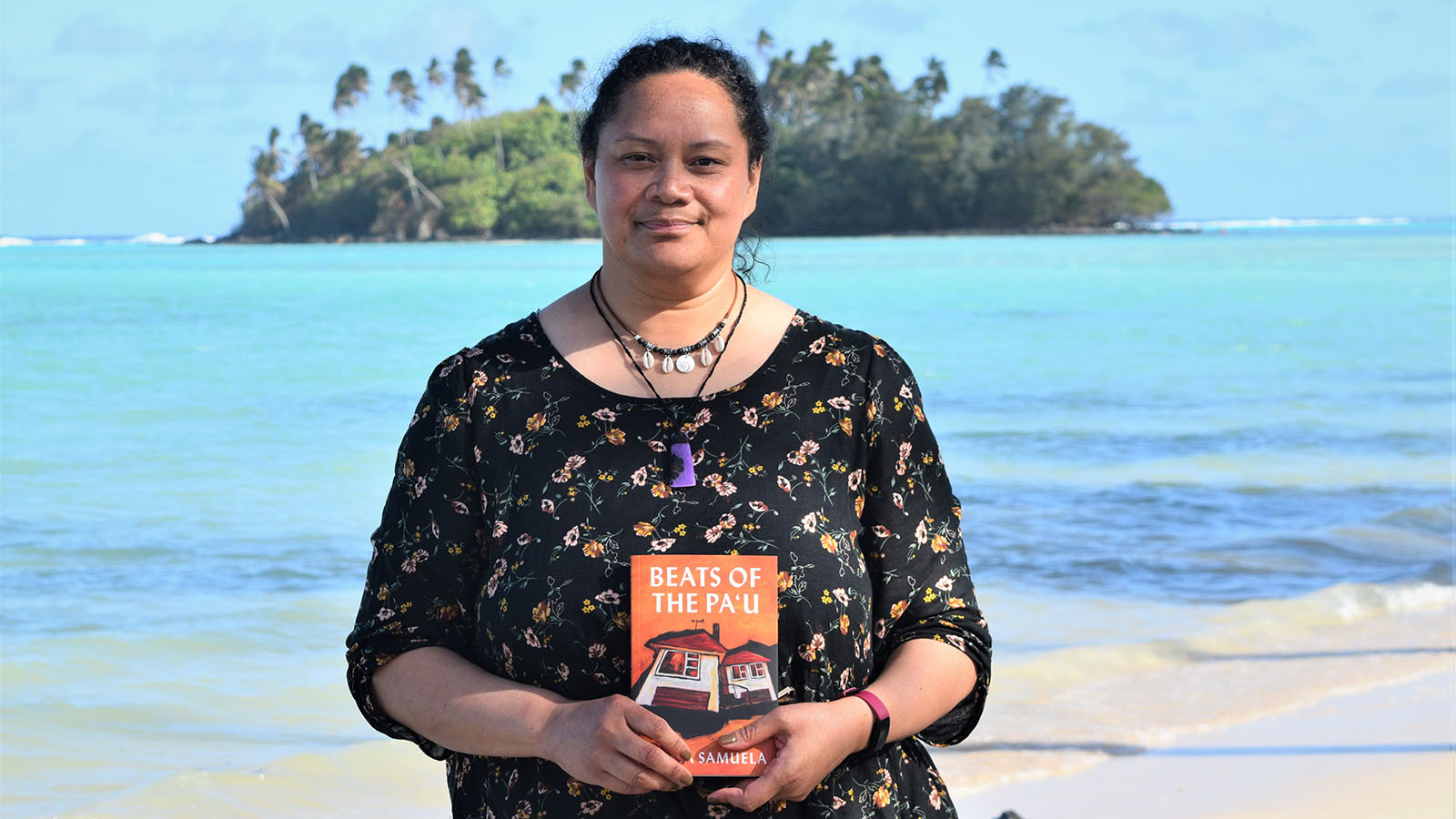Highlighting migration stories of Cook Islands women
Saturday 10 September 2022 | Written by Caleb Fotheringham | Published in Features

Maria Samuela stands at Muri beach holding her debut novel Beats of the Pa’ua. 22090915
A New Zealand-born Cook Islander has returned to the islands to learn more about her mother’s migration to Aotearoa.
Maria Samuela has returned to her roots researching her new novel about Cook Islands women’s migration to New Zealand between the 1930s and 1950s.
Samuela – a second-generation New Zealand Cook Islander living in Wellington – has roots in Mauke on her father’s side and Ngatangiia on her mother’s.
“I wanted to spend some time on her land and just soak up the island living and the atmosphere,” Samuela says outside of her beachfront accommodation. “I just thought it would be cool to wake up in the morning and see what she saw.”
Her upcoming novel, Kana, set in the 1950s is about young Cook Islands women’s migration to New Zealand from Rarotonga between the 1930s to 1950s.
The theme of the book came from Samuela’s debut novel, Beats of the Pa’ua, that came out earlier this year. The novel is a collection of stories about first and second-generation Cook Islands New Zealanders living in the 1950s to modern-day New Zealand.
One of the stories in the collection called Sisters was about older Cook Islands women who reunite for a special occasion – one of the characters is based on her mother.
“There is a scene in that story where she is remembering what it was like to move to New Zealand as a young woman and once I finished writing that story I knew I wanted to keep looking into that part. I felt like there was a bigger story there, possibly a novel.”
Samuela’s mother arrived in New Zealand in the 1950s when she was a young woman. She passed away when Samuela was 18.
Samuela says her mother’s early passing meant she never had the chance to have a conversation about what life was like when she came to New Zealand.
“I thought a cool way of seeing what her life might have been like as a young woman would be to do the research for this book, so that was kind of the inspiration.”
In her research, Samuela found the women who made the trip over to New Zealand had a range of feelings towards their arrival in Aotearoa.
“Some women were really excited to come to New Zealand and start a new life and to move on with their lives. Although they were going to miss their families they were willing to make that sacrifice, other women were really struggling with leaving.”
Samuela says one woman she found in her research didn’t want to leave the Cook Islands and even after settling she yearned to return to Rarotonga.
She says the new arrivals did all sorts of jobs from working as machinists, to being cooks on farms, domestic servants and becoming local politicians.
“I think their stories are so courageous,” Samuela says.
“They don’t know anyone, they don’t know the language, and they kept their family behind most of them, and they have to settle in this new land.
“They were the pioneers for our generations and I just think they were amazing.”
Samuela says some people were able to return to the Cook Islands but others never had the opportunity – like the women who yearned to return to Rarotonga.
For her mother, she only had the chance to return 30-years after landing in New Zealand.
Samuela grew up in Porirua – a city north of Wellington – in the 70s and 80s. She was part of a large Cook Islands Catholic community.
“We grew up with so many untold aunties, uncles and cousins, so we did have a strong sense of our Cook Islands identity.
“I had a strong sense of being a Cook Islander but also being a New Zealander.
“I’m very, very proud of being a Cook Islander, it was a reason I decided to write the stories, because there weren’t any stories out there.”
Samuela says the migration stories of Cook Islands women needed to be told to prevent them from being lost.
“For my generation and future generations, I think it’s important that we know how it all began for us.
“The sacrifices that our mother’s generation made for us helps me appreciate the opportunity that I have been given – that I have gone to school, being able to do the work that I do, being able to write books, opportunities like that.
“I got that because my parents made the sacrifice to leave their families to come to New Zealand and build up this new community.
“I think it’s important, for me anyway, to appreciate and remember the sacrifices that they made.”
Samuela says the book could still be years away from being published but she was loving the process.
Her first book Beats of the Pa’ua is available to be borrowed from Cook Islands Library and Museum.




















































